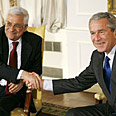
Time to talk
By stigmatising organisations such as Hizbullah, Hamas, there is no longer necessity to respect their constituencies, democratic mandates
Today, the United States’ campaign to reshape the Middle East is an unmitigated disaster. The ambitious project to create a democratic region has resulted in the deaths of over seventy thousand people, mainly civilians, in the Middle East and beyond.
Recent democratic elections in Afghanistan, Iraq, Lebanon, the Palestinian Territories and Israel have resulted in more rather than less violence. For Secretary of State Condoleezza Rice this may be the acceptable “birth pangs of democracy” but for millions in the Middle East the very notion of US-sponsored democracy is a misnomer.
Rather than assisting democracy and the perpetual peace that is supposed to ensue from it, the United States is perceived as a destabilising force that has wrought havoc in many societies and economies, be it intentional or not.
In identifying the promotion of democracy as a U.S. national security objective, the Bush administration has sought to influence the outcomes of elections, refused to deal with democratically elected governments not of its choosing, and arguably used democracy promotion as a Trojan horse to undermine governments in Iran and Syria.
In doing so, America has seriously undermined both its own democratic credentials and its ability to influence change in the region.
Greatest obstacle to peace and democracy
It is the Bush administration's dichotomous presentation of its war on terror that is the greatest obstacle to peace and democracy in the region. In attempting to portray conflicts in the region as between good and evil, freedom and terrorism, democrats and “Islamo-fascists”, debate is closed down and opportunities for engagement rejected.
Just as in the Cold War when nationalist movements were equated with communism, so now Islamic movements are regarded as tyrannical and belligerent - to be defeated rather than negotiated with.
By stigmatising organisations such as Hizbullah and Hamas as terrorist, which have legitimately built their reputations on extensive social welfare provision and a lack of corruption, there is no longer a necessity to respect their constituencies and democratic mandates. And yet it is only by engagement and searching for common ground that a way forward can be found in the region.
Engagement does not necessarily connote agreement; indeed healthy opposition and rivalry are essential components of democratic practice between nations, just as it is within nations.
What is necessary is being able to respect an opponent's right to hold different views. Democrats should seek to convert enemies into adversaries through the contestation of ideas rather than bullets. Demonising organisations and individuals reduces the possibility of negotiating peaceful outcomes to a zero sum game.
The demonised want similar things for their own families and neighbours that are taken for granted in America: the right to a peaceful life, to work, be educated, have a decent standard of living and not live under foreign occupation.
By branding others as fanatical, irrational and threatening, violent solutions are bound to appear more appropriate than attempts at resolving differences. Conflict resolution requires some recognition that opponents may have legitimate grievances and concerns, and that these need to be addressed.
Talk with the enemy
If the United States is genuinely interested in Middle Eastern democratisation, then it needs to start a dialogue not just with its friends in the region but also with its enemies, including Syria and Iran.
It needs to respect the electoral wishes of Palestinians in the Occupied Territories and enter into direct talks with Hamas about resuming financial assistance. At the same time it needs to take note that what is good for the Middle East must necessarily be what works for both Israel and its Arab neighbours.
As part of a more considered strategy of engagement, leading to the establishment of democratic norms, the United States should encourage the withdrawal of Israeli troops from Gaza, the immediate release of all democratically elected members of the Palestinian Assembly held in Israeli gaols, insist on respecting the sovereignty of Lebanon and engage with Hizbullah as a component of the Lebanese polity.
Over the past five years, we have heard much from the Bush administration about freedom and liberty but little about justice, fairness and respect in the Middle East. Without these there can be no freedom or liberty, and certainly no democracy.
Winston Churchill famously said that “jaw jaw is better than war war”, and this could still be America's contribution to peace in the Middle East. The time has come to start talking directly to leaders of antagonistic governments and organisations, as representatives of their peoples, and seek to achieve settlement to problems on the basis of equity and sustainability.
Lee Marsden is a lecturer in International Relations at Oxford Brookes University in the United Kingdom. Courtesy of the Common Ground News Service










